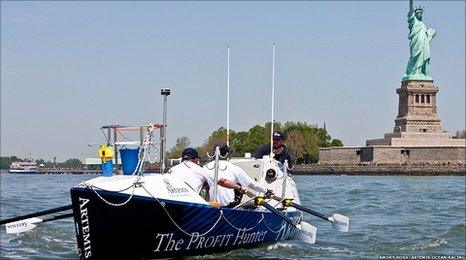Adventurers in a class of their own
- Published
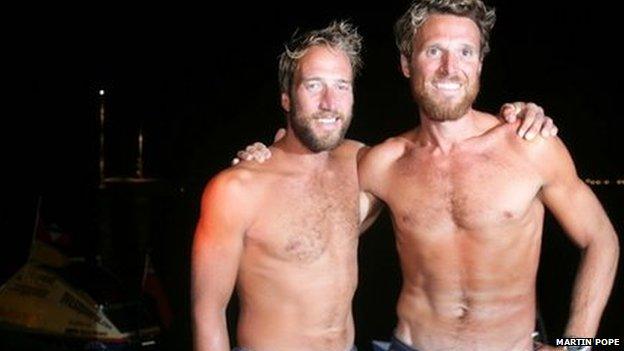
James Cracknell wrote of Atlantic rowing partner Ben Fogle: "Don't be fooled by the accent"
David Livingstone and Henry Stanley overcame poverty to become Victorian Britain's foremost explorers. Now adventuring seems to be the preserve of the rich and well to do. So are there any British explorers left who aren't posh?
"Let's face it, most of us don't go on adventures," says the broadcaster Andrew Collins. "The closest most people come is a gap year in a country with only intermittent wi-fi access.
"So it's little wonder that those who slot into the "adventurer" category come from backgrounds where spare time is at less of a premium."
He may have a point. The chief speaker at the Adventure Travel Show in London this weekend is Sir Ranulph Fiennes - also known as the 3rd Baronet of Banbury.
Along with fellow Eton-educated Bear Grylls and former Tatler picture editor Ben Fogle, they are just three of the many posh boys known for doing adventurous things for TV, charity or both.
But is it entirely due to privilege?
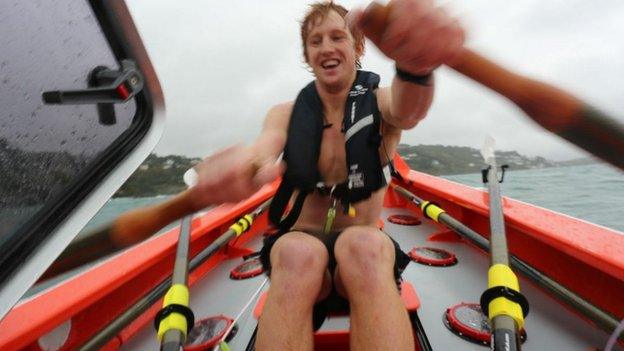
Former public schoolboy Tom Rainey is in training for an Atlantic row in May with friend Sam Coombs
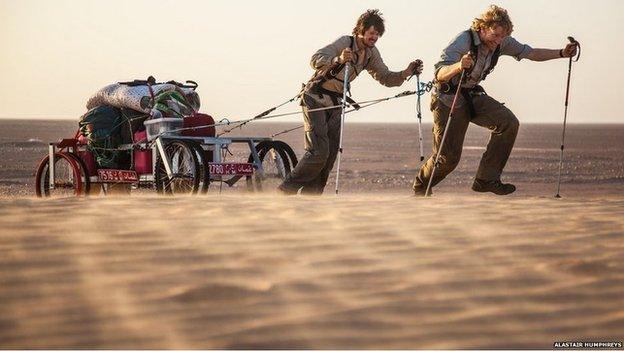
Alastair Humphreys, right, with Leon McCarron dragged a homemade steel cart through the so-called Empty Quarter of the Arabian Peninsula in 2012
"It seems more significant to me that TV adventurers often come from a military background," adds Collins.
"Bruce Parry, Bear Grylls, Ray Mears - it's easy to make the leap from that lifestyle to strapping on some boots and heading off into the unknown.
"Also, it's well known that public schools produce people with an overinflated sense of entitlement and confidence, both of which come in handy up a mountain."
Among adventure sports, nothing has more of a tendency towards toffness than ocean rowing.

Livingstone and Stanley
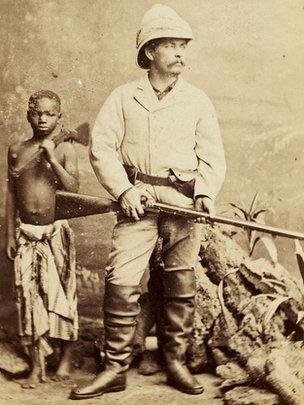
Henry Stanley grew up in a home for the destitute
The figure of the gentleman adventurer is, of course, nothing new.
But for Livingstone and Stanley it was more about having the right stuff than the right accent, says historian Tim Jeal.
Dr Livingstone came from a humble background and began work in a cotton mill aged 10.
Yet, after becoming a missionary and being posted to Africa, he made his name as an explorer of much of the continent.
Stanley, who also explored central Africa and famously found Livingstone there in 1871, grew up in a workhouse.
"Grylls and Fiennes are all remarkable people, very tough and resilient and quite amazing in that way," says Mr Jeal.
"But you can't see these people in the same light as Livingstone and Stanley, largely because Africa was like the back of the moon."

Eton-educated Prince William cheered home his Harrow-educated friend Olly Hicks, external on his return from his solo crossing of the Atlantic in 2005.
When Fogle rowed the Atlantic, external with Olympic medallist James Cracknell one year later, the latter dismissed the role poshness played, writing of Fogle: "Do not be fooled by the accent; competitiveness is not class based."
Yet among the latest contenders to cross the Atlantic is another public schoolboy, Tom Rainey, last year's winner of a Young Brits award, external by "outfitters to the gentry" Jack Wills.
The 23-year-old admits he has used his connections to fund his planned row across the Atlantic in May from New York to Salcombe, in Devon. Mr Rainey, who works in the oil industry, was able to put down a £20,000 deposit for the boat.
He and friend Sam Coombs, 24, aim to be the youngest team to row from mainland USA to mainland UK. The trip will take three months and raise some £250,000 for the Brain Tumour Charity in memory of Mr Rainey's father who died from the disease.
"I wrote hundreds of letters for sponsorship but they never really transpired," he says. "But we have family or friends connections with all our sponsors.
"It is 100% who you know and everyone who has donated has been extremely friendly and generous."
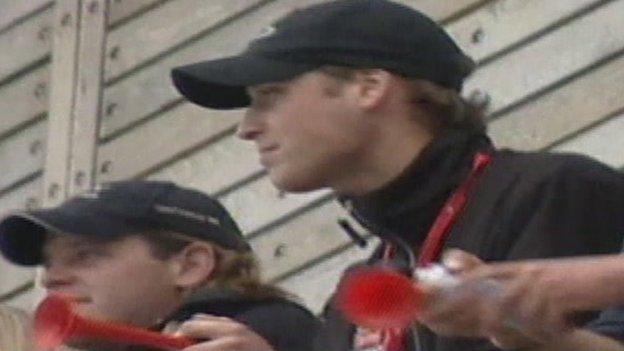
Prince William was at Falmouth for the homecoming of Atlantic rower and friend Olly Hicks
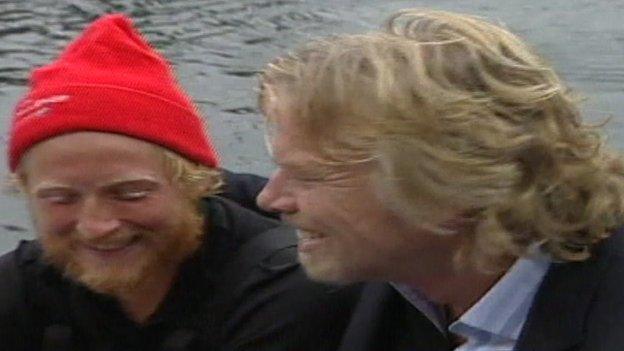
Virgin boss Richard Branson sponsored Olly Hicks solo row across the Atlantic
He believes public schools produce a disproportionately large number of adventure sportsmen because they encourage outdoor activities.
"I think that's the difference. I did kayaking and Combined Cadet Force at school and all that stuff taught me how to enjoy being outdoors."
But are there any "normal" folk treading a similar path?
Despite how it might appear, there are.
Edinburgh-based ocean-rowing veteran Leven Brown, 42, had to raise more than £84,000 to fund his first trans-Atlantic expedition., external
"I sold my house, car, I even sold my toaster, my DVDs, my Playstation, my furniture and we still didn't have enough money," he said.
"I remember after I bought my boat, sleeping in a park bench in Newcastle because the last train connection had gone.
"I thought it was just part of the journey. If you can't stand the idea of sleeping on a park bench perhaps you shouldn't row an ocean."
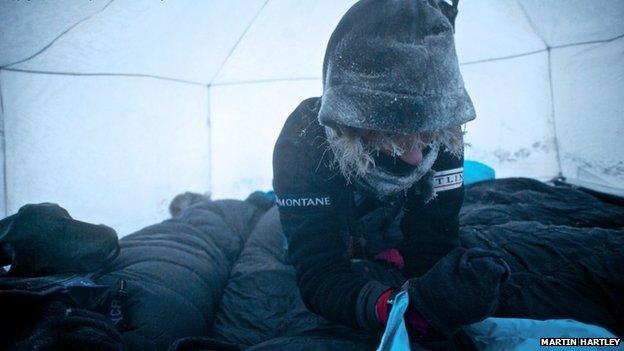
Polar explorer Ann Daniels: "It doesn't matter how rich you are."
Ann Daniels, who went to a comprehensive school in Bradford, was the first woman, along with expedition teammate Caroline Hamilton, to reach the north and south poles as part of all women teams.
Her father was a door-to-door insurance salesman and her mother was a secretary at Marks & Spencer.
"It doesn't matter how rich you were, what education you had, or what your background was when you are surviving from day to day," she says. "Become the 'you' who's normally hidden away behind the veneer of civilised society's rules and regulations."
And for those hard of cash but seeking adventure, the best policy is to look for a bargain.
Serial adventurer Alastair Humphreys, 38, who once dragged a homemade steel cart (filled with 300kg of supplies) for 1,000 miles through the so-called Empty Quarter of the Arabian Peninsula, went to public school but said there was nothing to stop anyone following in his footsteps.
"I spent four years cycling round the world and spent less than £7,000," he says. "I walked across India coast-to-coast and that cost me £500 including the plane ticket, so these things can be cheap.
"Rowing an ocean is expensive and that needs sponsors but you can do good things without much money."
- Published8 May 2014
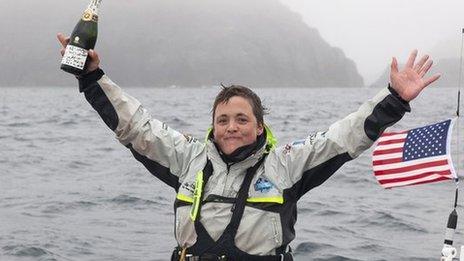
- Published27 April 2013
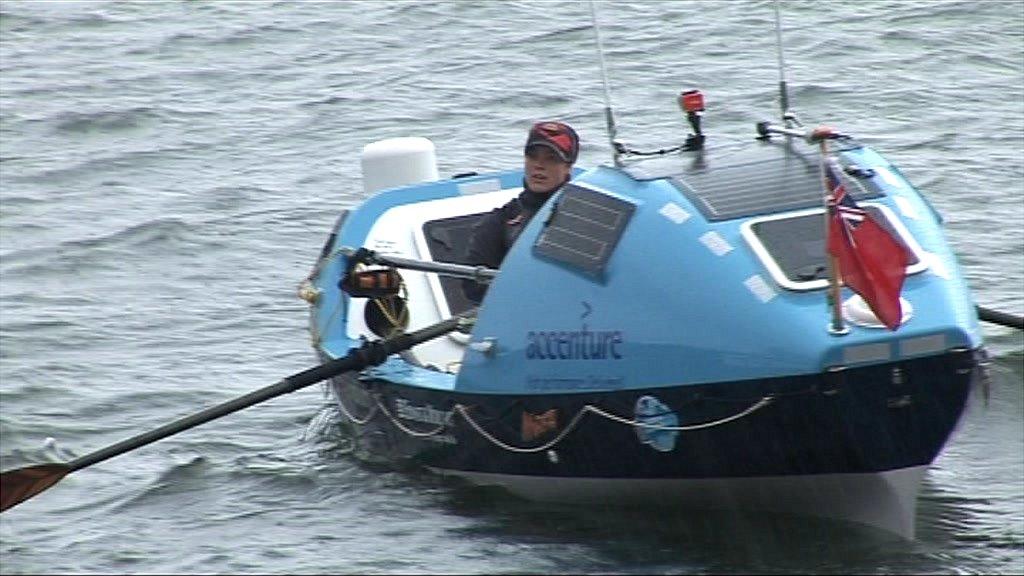
- Published3 August 2012
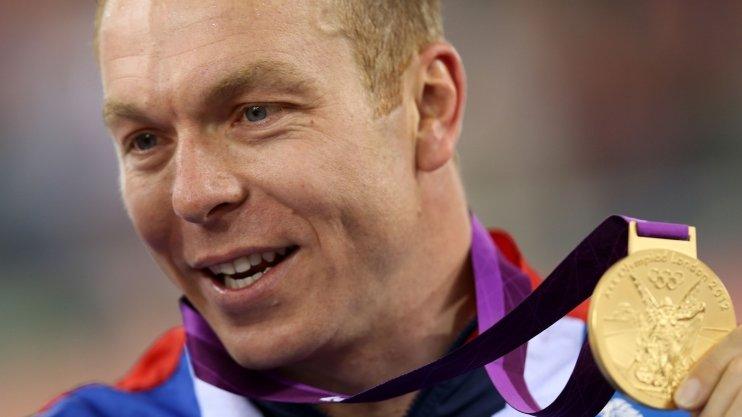
- Published31 July 2010
